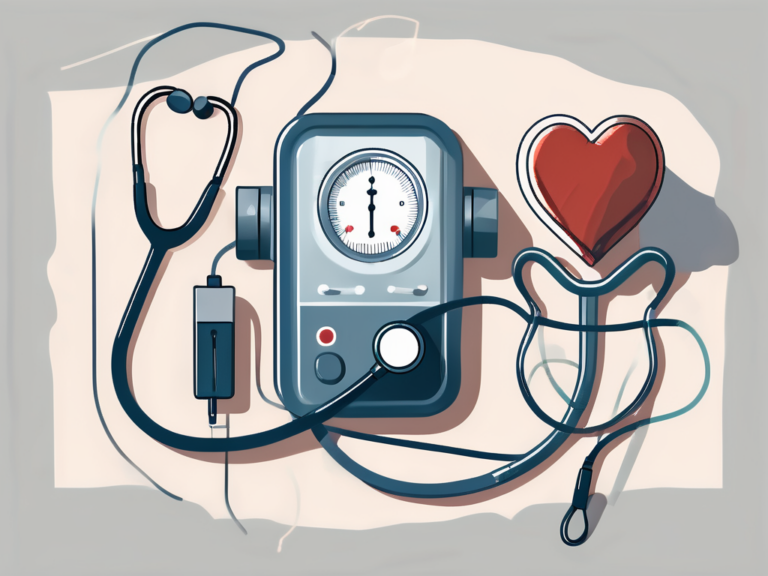Heart, Home and Vagus Nerve Stimulators
The vagus nerve, an important component of the autonomic nervous system, plays a pivotal role in regulating the functioning of various organs in our body. In recent years, there has been a growing interest in the potential therapeutic benefits of stimulating the vagus nerve, particularly in the context of cardiovascular health. Researchers have explored the use of vagus nerve stimulators both in clinical settings and at home, opening up new possibilities for improving heart health.
Understanding the Vagus Nerve
The vagus nerve, also known as the tenth cranial nerve, is the longest and most complex nerve in our body. It originates in the brainstem and extends through the neck, chest, and abdomen, branching off to innervate a wide range of organs, including the heart, lungs, and digestive system. This extensive network allows the vagus nerve to play a vital role in regulating many bodily functions.
Interestingly, the vagus nerve is not just involved in physical functions but also has a significant impact on mental and emotional well-being. It is often referred to as the “wandering nerve” due to its far-reaching connections and its influence on various aspects of our health.
The Role of the Vagus Nerve in the Body
The vagus nerve is primarily responsible for the parasympathetic nervous system, also known as the “rest and digest” system. It helps to promote relaxation, decrease heart rate, and regulate digestion. Additionally, the vagus nerve is involved in the release of neurotransmitters such as acetylcholine, which has anti-inflammatory effects on the body.
Furthermore, the vagus nerve plays a crucial role in the gut-brain axis, facilitating communication between the brain and the gut. This bidirectional communication is essential for maintaining gut health, influencing mood and cognitive function, and even regulating appetite.
The Connection Between the Vagus Nerve and the Heart
One of the key relationships the vagus nerve has is with the heart. It provides direct innervation to the cardiac muscles and plays a crucial role in maintaining proper heart rate and rhythm. By modulating the activity of the vagus nerve, it is possible to influence heart function and potentially improve cardiovascular health.
Moreover, the vagus nerve is involved in the body’s stress response system, helping to counteract the effects of the sympathetic nervous system and promoting a state of calm. Techniques such as deep breathing, meditation, and yoga can stimulate the vagus nerve, leading to relaxation and a sense of well-being.
The Science Behind Vagus Nerve Stimulators
Vagus nerve stimulators are cutting-edge medical devices that have revolutionized the field of neuromodulation. These devices deliver precisely calibrated electrical impulses to the vagus nerve, a crucial component of the parasympathetic nervous system. The vagus nerve plays a pivotal role in regulating various bodily functions, including heart rate, digestion, and inflammation. By modulating the activity of this key nerve, vagus nerve stimulators offer a promising avenue for treating a wide range of health conditions.
The implantation process of vagus nerve stimulators is a delicate surgical procedure that requires the expertise of skilled medical professionals. The small generator, typically placed in the chest area, is connected to one or more leads that are carefully threaded to the vagus nerve. This intricate setup ensures that the electrical impulses are delivered with precision, optimizing their therapeutic effects.
The Mechanism of Vagus Nerve Stimulation
When the vagus nerve is stimulated by the electrical impulses from the device, it sets off a cascade of physiological responses throughout the body. These responses are diverse and far-reaching, encompassing not only a reduction in heart rate and inflammation but also an increase in the release of neurotransmitters that regulate mood and cognition. By fine-tuning these intricate pathways, vagus nerve stimulation holds the potential to offer relief for a spectrum of health conditions beyond traditional cardiovascular concerns.
Furthermore, the intricate interplay between the vagus nerve and the brain highlights the complex nature of neuromodulation. The signals transmitted by the vagus nerve can influence brain activity, mood regulation, and even immune responses. This intricate network underscores the profound impact that vagus nerve stimulation can have on overall health and well-being.
Potential Health Benefits of Vagus Nerve Stimulation
The therapeutic potential of vagus nerve stimulation extends far beyond its initial applications in epilepsy and depression. Recent studies have shed light on its promising role in promoting heart health. By enhancing heart function, reducing inflammation, and mitigating the risk of cardiac events, vagus nerve stimulation emerges as a multifaceted approach to cardiovascular wellness. However, the full extent of these benefits and their long-term implications warrant further investigation through rigorous scientific inquiry.
As researchers delve deeper into the intricate mechanisms underlying vagus nerve stimulation, new possibilities for its therapeutic applications continue to emerge. From chronic pain management to immune system modulation, the potential avenues for leveraging this innovative technology are vast and varied. By unraveling the mysteries of the vagus nerve and harnessing its therapeutic power, medical science stands poised to unlock new frontiers in the realm of neuromodulation.
Vagus Nerve Stimulators and Home Use
Traditionally, vagus nerve stimulation has been conducted in clinical settings under the supervision of healthcare professionals. However, advancements in technology have led to the development of home-based vagus nerve stimulators, offering the potential for individuals to manage their treatment in the comfort of their own homes.
With the increasing demand for more personalized and convenient healthcare solutions, home-based vagus nerve stimulators have gained popularity among individuals seeking greater autonomy in managing their medical conditions. These devices are designed to deliver targeted stimulation to the vagus nerve, a key player in the body’s autonomic nervous system, which regulates essential functions such as heart rate, digestion, and mood.
The Evolution of Home-Based Vagus Nerve Stimulators
Home-based vagus nerve stimulators have evolved significantly over the years, becoming more compact, user-friendly, and accessible. These devices often incorporate advanced features such as wireless connectivity, personalized settings, and real-time data monitoring. With these advancements, individuals have greater control over their treatment and can track their progress effectively.
Furthermore, the portability of modern home-based vagus nerve stimulators allows individuals to integrate their treatment seamlessly into their daily routines, whether at home, work, or on the go. The discreet nature of these devices enables users to experience the benefits of vagus nerve stimulation without interrupting their lifestyle or activities.
Safety and Efficacy of Home Use
While home-based vagus nerve stimulators offer convenience and autonomy, it is essential to consider their safety and efficacy. Before using any medical device at home, individuals should consult with their healthcare provider to ensure it is suitable for their specific needs. Regular follow-up appointments and ongoing communication with healthcare professionals are crucial to monitor progress, address concerns, and make any necessary adjustments to the treatment plan.
Additionally, individuals utilizing home-based vagus nerve stimulators should familiarize themselves with the device’s operation, maintenance, and safety protocols to ensure optimal outcomes. Adhering to proper usage guidelines and seeking professional guidance when needed can help individuals maximize the benefits of vagus nerve stimulation while minimizing potential risks.
The Future of Vagus Nerve Stimulation
The field of vagus nerve stimulation continues to evolve rapidly, with ongoing research and developments paving the way for new possibilities and potential applications.
Emerging Research and Developments
Researchers are exploring the potential benefits of vagus nerve stimulation for various health conditions beyond epilepsy and depression. From chronic pain management to autoimmune disorders, ongoing studies are shedding light on the potential therapeutic effects of stimulating the vagus nerve. For example, recent research has shown promising results in using vagus nerve stimulation to alleviate symptoms of rheumatoid arthritis, a chronic autoimmune disease that causes joint pain and inflammation. By modulating the activity of the vagus nerve, researchers believe that it may be possible to regulate the immune response and reduce inflammation in patients with this condition.
Advancements in technology and neuroscientific understanding continue to refine the techniques and devices used in vagus nerve stimulation. One exciting development is the use of bioelectronic implants that can target specific branches of the vagus nerve, allowing for more precise stimulation. This targeted approach has the potential to enhance the effectiveness of vagus nerve stimulation and minimize side effects.
Potential Implications for Heart Health
As the research progresses, the potential implications of vagus nerve stimulation for heart health are becoming increasingly intriguing. By influencing the activity of the vagus nerve, it may be possible to enhance heart function, mitigate inflammation, and improve overall cardiovascular health. Studies have shown that vagus nerve stimulation can have a positive impact on heart rate variability, a measure of the heart’s ability to adapt to different situations. This suggests that vagus nerve stimulation could potentially be used as a non-invasive therapy for conditions such as heart failure and arrhythmias.
Furthermore, researchers are investigating the use of vagus nerve stimulation as a potential treatment for hypertension, or high blood pressure. By stimulating the vagus nerve, it is believed that blood pressure can be regulated, potentially reducing the risk of cardiovascular events such as heart attacks and strokes. However, it is important to note that vagus nerve stimulation should always be carried out under the guidance of healthcare professionals and in conjunction with traditional medical interventions.
In conclusion, the future of vagus nerve stimulation holds great promise in the realm of heart health. The intricate connection between the vagus nerve and the heart underscores the potential benefits of modulating vagal activity. While home-based devices offer convenience, individuals should prioritize their safety and consult with healthcare professionals. The ongoing research and developments in vagus nerve stimulation continually expand our understanding and open new avenues for improving heart health. Exciting possibilities lie ahead as we continue to explore the potential of this innovative therapy.





